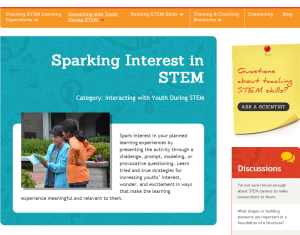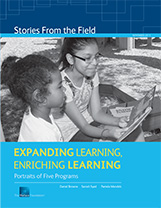 An exciting new resource to help out-of-school STEM providers is now available online. Click2SciencePD.org is a brand-new site devoted to providing free professional development resources to trainers, coaches, site directors and frontline staff/volunteers working in out-of-school time programs serving children and youth. The materials are focused on developing 20 “Essential Skills” identified by University of Nebraska-Lincoln Extension and the Noyce Foundation as necessary to implement science effectively in out-of-school time settings.
An exciting new resource to help out-of-school STEM providers is now available online. Click2SciencePD.org is a brand-new site devoted to providing free professional development resources to trainers, coaches, site directors and frontline staff/volunteers working in out-of-school time programs serving children and youth. The materials are focused on developing 20 “Essential Skills” identified by University of Nebraska-Lincoln Extension and the Noyce Foundation as necessary to implement science effectively in out-of-school time settings.
Evaluations of the national Frontiers in Urban Science Exploration (FUSE) initiative, led by Every Hour Counts, have shown that professional development is a critical element for supporting strong informal STEM education programs. Investing in training for frontline staff not only contributes to a program’s overall professionalism, it also increases staff and volunteer confidence and results in the implementation of high-quality activities. In fact, after participating in professional development activities, out-of-school time STEM staff in FUSE programs who lacked background or experience in STEM content were able to “catch up” to their more experienced counterparts, implementing high-quality programming and demonstrating strong facilitation strategies.

